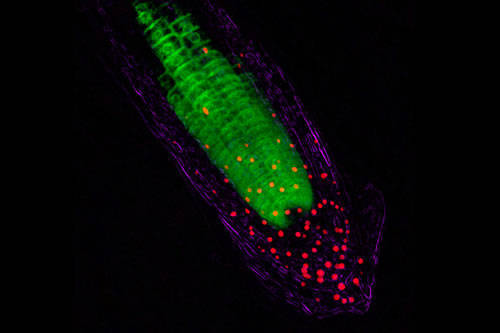Research reveals how plant roots perceive light
Date:2018-07-24
A study published in the journal Science-Signal recently showed that plants seem to transport sunlight directly to the roots of the ground to help them grow.
It is well known that photoreceptors in stems, leaves and flowers regulate plant growth. Although these receptors are also found in the roots, it is still unclear how they perceive light in the dark soil.
Hyo-Jun Lee and colleagues from Seoul National University in South Korea studied the phenomenon using a small flowering plant from Brassicaceae, Arabidopsis thaliana. They found that the stems of Arabidopsis act like fiber optic cables, directing light down to the root receptor called phytochrome. This triggers a protein called HY5 that promotes healthy root growth.
▲ Sensing light in the dark. (Source: Dr John Runios/Science Photo Library)
When these plants were engineered to possess phytochrome mutations, the yield of HY5 began to decline. And when they have HY5 mutations, their root growth is hindered and the angle of stretching is very weird.
To confirm that light is transmitted directly through the plant rather than activating the signaling chemicals that travel through the roots, the researchers connected a light source to the stem of the plant via fiber optics. A ground detector at the end of the root confirms that light is transmitted directly there.
More importantly, when they treated Arabidopsis samples in the dark with common plant signaling chemicals such as sucrose, no significant signs of increased root growth were observed. This suggests that such chemicals do not drive growth.
The study also found that red light is most efficient in moving within plants. Lee said that the long wavelengths of such light may be advantageous because they can travel farther than shorter blue and green wavelengths. He also said that most plants have phytochrome, which suggests that direct transport of light through the stem to the root is a common mechanism used to optimize root growth.
【Close】




 +86-760-22115926 Anna Zhang
+86-760-22115926 Anna Zhang
 gaea668@263.net
gaea668@263.net

